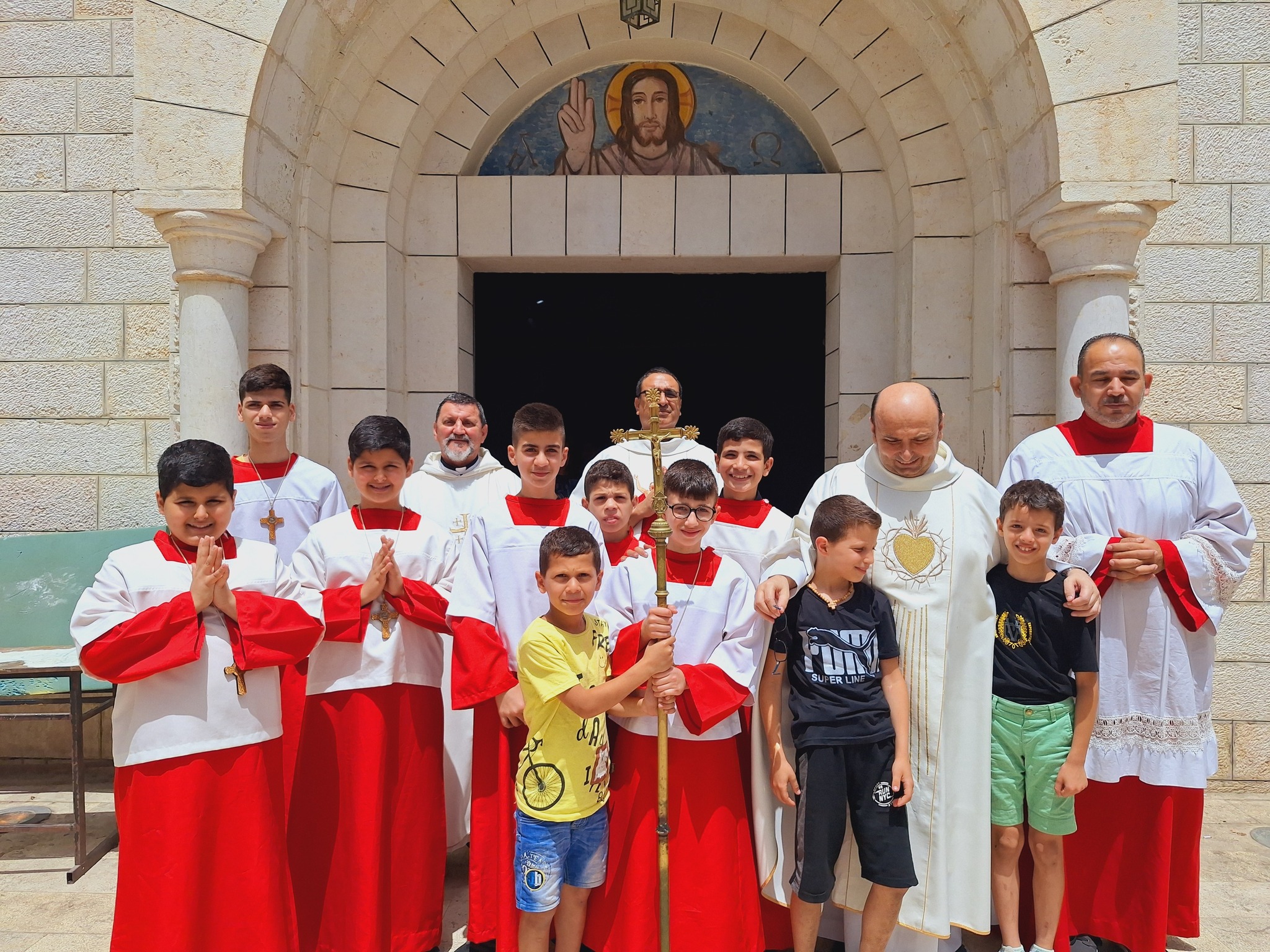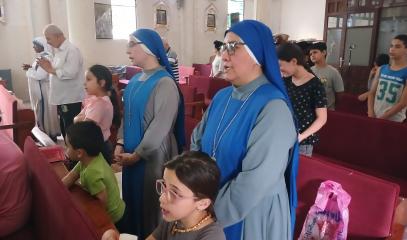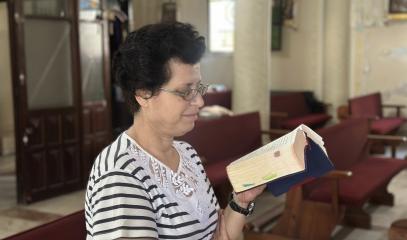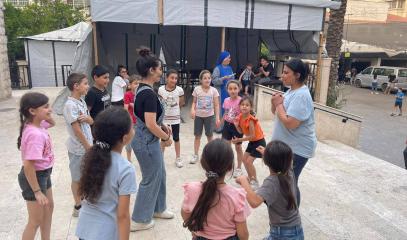For Gaza parish priest, Pope Leo's closeness gives hope, urges famine relief
Fr Romanelli emphasises the “strong bond” between Gaza Christians and this pontiff and his predecessor. Appeals for peace come with strong emphasis on the severe famine underway. While the Israeli military is pursuing the offensive, Netanyahu, under US pressure, is allowing limited aid delivery. For the clergyman, the greatest hope for Palestinians is to be able to live in their own land.
Milan (AsiaNews) – Fr Gabriel Romanelli, the parish priest of the Latin Church of the Holy Family in Gaza, spoke to AsiaNews by phone about Pope Leo XIV’s homily at the inaugural Mass of his pontificate celebrated yesterday as well as the words he pronounced at the Regina Caeli. Meanwhile, Israel is set to allow some aid into the territory.
“We feel a very strong bond with the pope, first with Francis and now with Leo XIV, because through them we feel the closeness and solidarity of all people. We are comforted by the appeals the pontiff has made on the first day in St Peter's, which he has reiterated several times.”
For the Argentine priest, a member of the Verbite order, the pope’s “appeal for peace comes with great emphasis on the situation of severe famine throughout the Gaza Strip" where its two million people are in “extreme need”.
The clergyman stresses the importance of the bond with the pope and his prayers, both in the daily evening phone calls with Pope Francis before and through the messages and words of the newly elected Leo XIV.
“Gaza Christians are very religious and know that the prayers of the Holy Father are protection before God; without this element, it is not possible to understand what we experience now and what we have experienced before.
"In addition, people understand that the pope, in addition to being the Vicar of Christ on earth, is also a prominent world leader. He meets the powerful of the earth and does not hesitate to talk about peace, issue appeals for the end of the war, the release of hostages, and the delivery of aid.
“All this, “ Fr Romanelli notes, “is an element of comfort, because no world leader speaks of peace like him, so much so that he has offered the Vatican as a place for meeting and mediation between different people, between enemies.”
Although his parish has not received aid for three months, "the Latin Patriarchate has always been close to us, and the Church, as soon as it can, is set to support tens of thousands of families, as it has always done, with real help. Precisely for this reason, we hope that they will let in basic necessities.”
In this regard, it should be noted that dozens of lorries loaded with humanitarian aid are ready to enter Gaza. A UN official, on condition of anonymity, has confirmed the information. At least 20 vehicles, mainly carrying food, are in the border area ready to enter the territory and ease the ongoing humanitarian emergency. Other sources say that at least three lorries loaded with goods are ready on the Israeli side of the Kerem Shalom crossing.
Although the Israeli cabinet, pressured by its US ally but internally split over the aid, does not want to make any official statement for now, Palestinian media are reporting that at least 50 lorries with flour, cooking oil and legumes should be let into the enclave this afternoon at the latest; for their part, Israeli media say that nine lorries with baby food are expected in the next few hours.
Under pressure from the United States, Israeli Prime Minister Benyamin Netanyahu has reportedly given the green light to aid in Gaza, which has been on hold since 2 March when he imposed a blockade, sparking criticism from foreign governments and NGOs. Some critics note that the aid has become a "weapon of war" against Hamas, in response to the attack on 7 October 2023.
Radical right-wing religious parties and members of the Israeli cabinet have slammed the government's decision. The latter is not only meant to avert a hunger crisis in Gaza but is meant to enable the “Gideon's Chariot” operation that began over the weekend to continue.
The offensive’s stated aim is to take control of Gaza. In a few days, it has already killed hundreds of Palestinians, mostly civilians. At the same time, it has been loudly criticised by the families of Israeli captives held by Hamas.
A group representing captives’ families in Gaza warns Israel's military action poses a “severe threat” to the hostages held by Hamas. In a report, the Hostages and Missing Families Forum says that expanded fighting "dramatically increases" the risk of harm to hostages. The group accuses Netanyahu of “killing the living and erasing the dead. Every bombing, every delay, every indecision increases the danger," said Professor Hagai Levine, who co-authored the report.
Meanwhile, the Israeli military is continuing its attacks in the Khan Younis area. An Arabic statement posted on social media by IDF spokesperson Avichay Adraee tells residents of Khan Younis, Bani Suheila and Abasan governorates to leave. “The IDF will launch an unprecedented attack to destroy the capabilities of terrorist organizations in this area,” it reads. For this reason, residents “must evacuate immediately west to Al-Mawasi area. From this moment, Khan Yunis Governorate will be considered a dangerous combat zone.”
So far the Israeli operation has wiped out entire families, this according to Khalil Al-Deqran, a spokesman for the Gaza Ministry of Health. In fact, the health emergency is getting worse, with the Indonesian hospital now out-of-service.
Gaza’s healthcare system is barely operational and blocking aid has aggravated the situation. Israel claims that Hamas has stolen the aid, a charge Hamas has denied, while more and more children are dying.
The Palestinian civil emergency service says that 75 per cent of ambulances are not working due to fuel shortages and, soon, all vehicles will grind to a stop.
“There is a bit of hope that aid might enter,” Fr Romanelli said, “but for Gaza Christians and the population in general, the greatest hope is to receive a clear sign that they will be able to continue to live and rebuild their land.”
At present, “it is no exaggeration to use the word famine. It is true that we are better off than in other parts, but this does not mean that we are well,” said the Verbite priest, speaking about the area where the parish is located.
“We ration what we have for our 500 refugees, but it's not like we have it for who knows how long. We sift the flour two or three times to separate it from the worms and despite trying to purify the water we have several cases of dysentery. Such a problem can be solved with simple drugs available in the world, but not here.”
There are many needs, but "the first is for the war to end, for the hostages to be freed and, for aid to come in.” It is important “to receive a clear sign that these people can live in freedom in their own land, not outside their land or in their land without freedom.”
18/07/2025 18:25
22/08/2025 14:42










.png)










